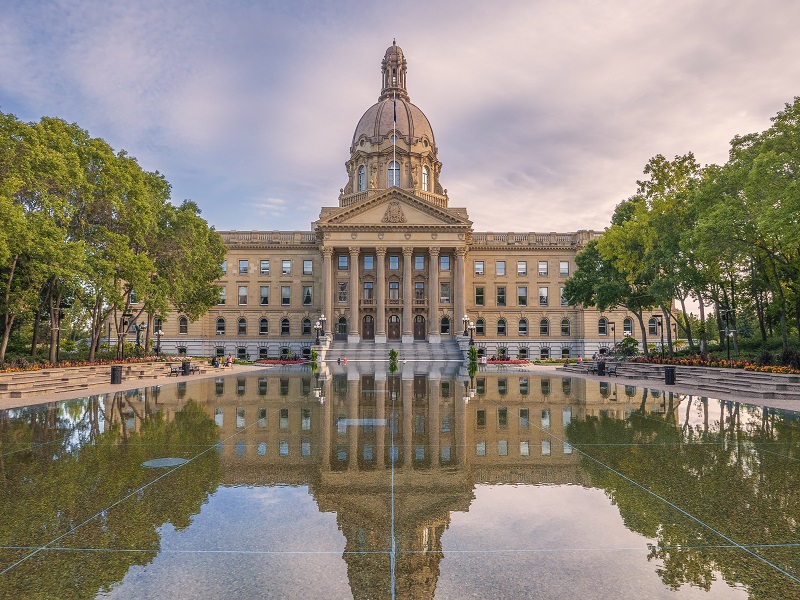
Alberta Premier Danielle Smith won’t say what happened to her government’s promise to hold face-to-face meetings with citizens in December on quitting the Canada Pension Plan.
However, thousands of citizens got their say or tuned in to five recent telephone town hall consultations, she said during a house question period last week, noting nearly 100,000 people participated online. “We’re going to ask the chair of that committee, Jim Dinning, to give us his impressions of where we find ourselves.”
New Democratic Party Leader Rachel Notley noted it was Dinning himself who promised in mid-October there would be in-person meetings in December. She said Smith’s answer “sounds like a hedge to me and yet another broken promise.”
Read: Alberta rules out Quebec pension model despite promise to wait for public feedback
At the first telephone town hall on Oct. 16, he announced the next step would be in-person town hall sessions in December, characterizing such meetings as integral to drilling down to the key points of concern. Dinning’s panel concluded its fifth and final telephone town hall last week without updating the December meetings.
“The [telephone] town hall meetings give us a chance to hear what are the issues,” said Dinning. “By then, we’ll have a better idea of what are some of the concerns that folks have and we can begin to address those in a more focused fashion in the town hall face-to-face sessions . . . in December. . . . We’re going to reflect on what we’ve heard in these five town hall meetings and decide on next steps. You’ll hear from us in the days ahead.”
Dinning’s panel is tasked with gathering information and presenting it to Smith in the spring, who will then decide if there’s enough interest to take it to a referendum. The panel is focusing debate on a government-commissioned report that calculates Alberta, with its relatively higher incomes and younger population, could flourish with its own plan. The report found Alberta, given the outsized contributions of its workforce multiplied by compound interest, is owed $334 billion — more than half the assets of the CPP.
Read: Alberta deserves more than half CPP assets if it exits program: report
NDP deputy house leader Heather Sweet told reporters that in-person meetings would be harder for Dinning’s panel to stage manage, noting a majority of Albertans are making it clear they don’t want to leave the CPP.
“When you do a telephone town hall, you filter out the questions. When you’re in person, you have to have true, honest facts and you have to be willing to listen to the people in the room and this government has clearly said that they’re not willing to do that.”
The NDP has already started its own in-person discussions and has five more announced for the weeks ahead. The party said an event last week in Edmonton drew hundreds and showed overwhelming consensus to stay in the CPP — a sentiment the NDP said matches its survey of more than 37,000 respondents.
The final town hall by the Dinning panel featured a mix of comments for and against an Alberta-only plan, with most of the callers having questions on how such a plan would work. A number of callers said the plan encourages a discouraging “me, me, me” attitude on the part of Albertans, while others said, “the less Ottawa the better.”
Read: Former federal finance minister defends ‘sustainably successful’ CPP amid Alberta pension exit plan
In an open letter, the Alberta Federation of Labour called on Dinning’s panel to resign, noting its readiness to shut down or contradict callers who disagreed with an Alberta pension plan is one of many reasons to dismiss its legitimacy.
“Telephone town hall participants have rightly described this entire process as ‘an outcome in search of legitimization,'” said Gil McGowan, the AFL’s president.
In a statement, Finance Minister Nate Horner dismissed McGowan’s letter, noting the AFL has formal ties with the NDP. Still, other provinces have expressed concern about what would happen to the CPP if Alberta left. In response, federal Finance Minister Chrystia Freeland has asked the chief actuary to provide an estimate. Smith has said if the feds and Alberta can’t agree on an exit number, the issue may have to be decided by the courts, a process that could take years.
Read: Alberta would need to negotiate international agreements if it quits CPP: Freeland
